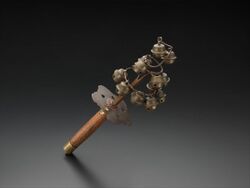Engineering:Suzu

Suzu (鈴) is a round, hollow Japanese Shinto bell that contains pellets that sound when agitated. They are somewhat like a jingle bell in form, though the materials produce a coarse, rolling sound. Suzu come in many sizes, ranging from tiny ones on good luck charms (called omamori (お守り)) to large ones at shrine entrances. It is, however, classified as a small bell since big bells are referred to as kane.[1] The former is associated with Shinto and shrines while the latter is related to Buddhist temples and ceremonies.[1]
At Shinto shrines, large Suzu drape over entrances, as it is said that ringing them calls kami, allowing one to acquire positive power and authority, while repelling evil. Handheld clustered Suzu, similar to jingle bells, are used musically at Shinto ceremonies. There are ceremonies, for instance, where female performers dance with suzu bells such as those with some sort of short blade at its center.[2] The bell's cool tinkles are also considered psychological air-conditioning for the summer since their clear ringing is considered cool and refreshing.[3]
In Edo Castle the larger corridor to the Ōoku which only the shōgun as the only male was allowed to enter, was called Osuzu Rōka (御鈴廊下, large corridor of the bells), derived from the ringing of the suzu bells to announce his entrance.
Suzu were traditionally made by metal craft artisans. With the onset of industrialisation, they were made by machines. The ones produced by hand however are still considered of higher quality due to the richer and more melodious sound.
Other references
Suzu is also a female name in Japan meaning "Bell" or "Tin". The kanji for suzu is often used to form a compound name, such as the well-known surname Suzuki, meaning "bell and tree".
See also
- Kagura suzu
- Fūrin
References
- ↑ 1.0 1.1 Joya (2017-07-12) (in en). Japan And Things Japanese. Routledge. ISBN 9781136221866. https://books.google.com/books?id=tIUECwAAQBAJ&pg=PT28&dq=suzu+bell#q=suzu%20bell.
- ↑ Nelson, John K. (1996). A Year in the Life of a Shinto Shrine. Seattle, WA: University of Washington Press. pp. 96. ISBN 9780295975009. https://archive.org/details/yearinlifeofs00nels/page/96.
- ↑ Gill, Robin D. (2006). Cherry Blossom Epiphany: The Poetry and Philosophy of a Flowering Tree. Paraverse Press. pp. 187. ISBN 0974261866.



